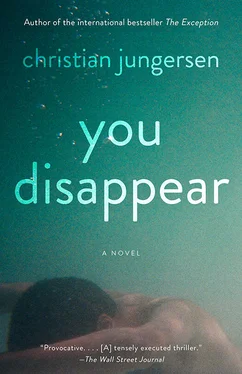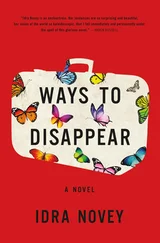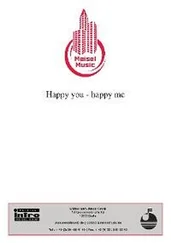Winnie had called. He called her back and heard from her that practice had been delayed a little, and there was no need to worry.
He began setting the table, with Lærke at his heels, rolling back and forth between kitchen and living room so that she blocked the doorway every time he went back to get something new. Since she was following him anyway, he gave her something to take out to the table.
And then he sat down and waited. And Lærke rolled over to his side.
Tired, he stared into the air, and tired, she stared into the air. But at some point he had sat still long enough, and he turned his face to her. She didn’t turn hers.
He said, “What I wouldn’t give to know what’s going on in your head.”
She made no reply.
“Lærke, what are you thinking right now?”
She still didn’t answer.
He grabbed her hand so that she turned to face him. He looked her in the eye and asked again, “What are you thinking, sweetheart?”
“Nothing.”
“You’re not thinking of anything?”
“No.”
“Your mind’s a complete blank?”
She continued looking wordlessly in front of her.
But he couldn’t let the riddle rest. “Do you see images, or is there something that’s making you sad, or happy? Something we could do differently? Are you excited about physical therapy on Monday? Are you remembering something we’ve done together?”
“Yes, it’s completely blank,” she said. “Completely.”
• • •
As any family member of someone with brain damage knows, the hard part isn’t the initial shock. The hard part comes when the adrenaline recedes and you have to set out down the endless grey corridor of disheartening days, days that look like they’ll last the rest of your life.
The daily grind in which companionship is lacking. Where you find yourself more alone than you thought humanly possible; where you grieve so much, you just want to stay in bed for months. And where you force yourself to get up anyway for your kids’ sake — and because your spouse isn’t actually dead.
Yet there are joys, too. During the first year after the accident, Lærke became better at remembering, speaking, moving — and she began to get her feelings back. Just seeing the boys could once more make her happy.
And then one day when Bernard was sitting at home, working in what used to be his home office but was now furnished as a bedroom for his in-laws, she came in to him beaming with pleasure.
“I was daydreaming! I lay on the bed, and then I imagined being on vacation with the three of you. Imagined it! There were palms there, and a beach. I just imagined it and it showed up, completely on its own!”
Could anything be more momentous than the return of your inner life? Bernard and Lærke celebrated. And the boys did too. They understood what a big day it was for their mother to imagine things once more.
I press my bare chest against Bernard’s as he tells me this, and it’s as if my body thinks it’s me he’s crying for. Rationally, I know that’s not true, but my arms squeeze him tighter, and I feel the urge to say, But I’m here, really. I’m not dead, don’t cry. I’m right here .
And I try to be a little bit Lærke, and it’s almost as if he’s my old Frederik. And I wish I could just wrap my arms around Niklas like this — with my clothes on, of course — just hold him and weep with him for the real husband and father who now is dead.
For a second, it’s Frederik who lies in my arms. We’re at Trørød Elementary. We’re young again and I’m a student teacher, he the committee chair for teachers of Danish. We’re starting our lives all over again. Bernard met me when I was an au pair in Paris, and he followed me here to Denmark. I am his young healthy wife.
“Whenever water appears in dreams or fantasies, it symbolizes feelings — particularly feelings of grief and depression. And I must say, Mia, that never in my life have I seen such a huge collection of water photos. I have absolutely no doubt that Niklas is one deeply unhappy young man.”
My mother-in-law’s on the phone, all worked up. Yesterday she joined Facebook, and since then she’s been going through the photo albums Niklas posted.
Since Frederik’s well enough to be left home by himself now, his parents no longer come over as often. Yet every day when Vibeke’s name shows up on my phone display, I can’t help but groan a little before I take the call.
“It’s an art project he did last winter with Mathias,” I say.
“But why did he pick water as the theme for the project?”
“It wasn’t him who—”
“Or if he wasn’t the one who picked the theme, why did he take on this particular project, when other people had decided it’d be about water?”
“Can’t you just look at the pictures as some beautiful photos where he’s simply practicing how—”
“Mia, you’re going to have to trust me on this one. It’s no coincidence that he threw himself into a project that happens to involve water. Young people today have thousands of other options. There’s a reason for everything — even if you may not want to admit it. I’m actually studying for a certificate in this, you know.”
I stare down at the pension papers I was about to dig into. What are the rules for withdrawing some of your pension funds before they mature? The tax consequences?
“Water can also represent trauma,” she continues. “A sense of entrapment while experiencing volatile emotions, for instance hate or feelings of inadequacy. Quite often, water symbols can be traced back to a parent who makes it impossible for a child to express his feelings.”
“Vibeke. Can’t you ever let it rest?”
“There might be some primordial situation, perhaps several years in the past, in which the child was overpowered by the parents. He felt surrounded — as if it was water threatening to drown him. A new crisis could actualize the repressed emotions.”
“So just to be perfectly clear: you think I’m to blame for this.”
“Oh, not at all, Mia! I’m only saying how one usually … ”
• • •
After the conversation’s over, I gaze out of our big new windows at the apartment block opposite. Beyond it’s the sky and more apartment blocks, while behind me looms the large earthwork that’s supposed to dampen the freeway’s continual drone.
Though I completely disagreed with my mother-in-law on the phone, and though I still consider her psychological “expertise” an utter fraud, her description of my relation to Niklas couldn’t be more accurate. He feels I suffocate him — exactly like water that’s drowning him. And he feels that way no matter how much distance I keep, how much room I give him. I retreat farther and farther, making hardly any demands on him with respect to his father’s illness, and still he feels stifled. Where will it end? Do I have to disappear completely before he can feel free?
For almost four years now, without naming it directly, Vibeke’s been circling around the night I had a breakdown after throwing Frederik out. The night that I was sure I was embarking on a happy new life, but that instead made it clear I couldn’t manage without him.
I remember how Niklas was then. It’s only a few years ago, but he wasn’t that big, just thirteen. He was wearing his orange hip-hop hoodie when he came to see me in the hospital. Frederik was there too. Who was I that night? Niklas’s thin fair hand in mine, his pale face. How could I have? That wasn’t me, was it? Hardly the “real” Mia. Was it because Frederik and I have always been “meant for each other,” like he said? Was it because, dream as I might about slipping free from his grasp, in truth I’m nothing without my unfaithful, criminal, brain-damaged husband?
Читать дальше



![Ally Carter - [Gallagher Girls 01] I'd Tell You I Love You But Then I'd Have to Kill You](/books/262179/ally-carter-gallagher-girls-01-i-d-tell-you-i-lo-thumb.webp)








